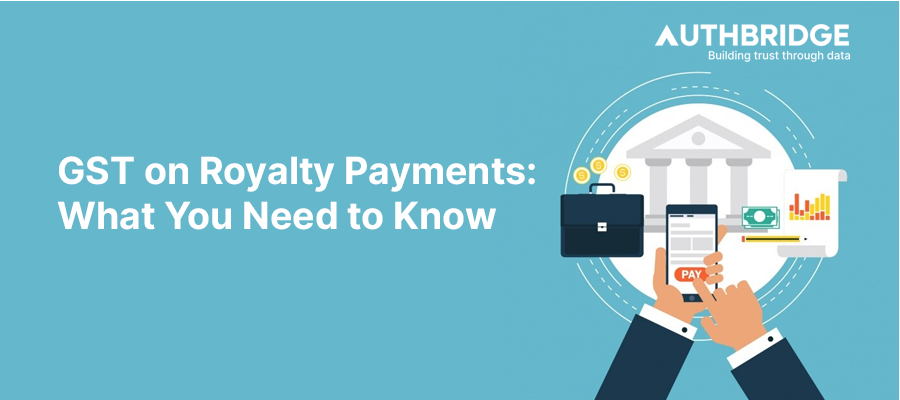Navigating GST On Royalty Payments: A Guide For Businesses In India

The Goods and Services Tax (GST) has reshaped the tax landscape in India, streamlining the indirect tax regime into a unified framework. Among the various facets of GST, the treatment of royalty payments stands out for its complexity and significance, especially for businesses involved in technology, mining, and intellectual property. This guide delves into the intricacies of GST on royalty payments, offering insights into its applicability, rates, and compliance mechanisms.
Introduction to GST on Royalty Payments
Definition of Royalty in the Context of GST
Royalty payments are compensations made for the right to use copyrighted works, patented inventions, or natural resources. Under GST, royalties are considered a supply of services, attracting GST in accordance with the specific circumstances under which they are paid.
Legal Framework Governing GST on Royalties
The legal framework for GST on royalties is embedded in the Central Goods and Services Tax (CGST) Act and the rules therein. These regulations outline the conditions under which GST is levied on royalty payments, ensuring uniformity across states and sectors.
Applicability of GST on Royalty Payments
General Applicability and Exceptions
GST on royalty payments applies to most sectors, including technology, entertainment, and natural resources. However, exceptions exist, such as certain educational materials and copyrighted works, where GST may not be applicable or is subject to lower rates.
Royalty Payments to Government for Mining Rights
Royalty payments made to the government for mining rights are subject to GST under the reverse charge mechanism (RCM), highlighting the government's intent to tax the exploitation of natural resources uniformly.
GST Rates and SAC Codes for Royalty Payments
Determining the GST Rate for Royalty
The GST rate for royalty payments typically stands at 18%, aligning with the standard rate for services. However, specific cases may attract different rates based on the nature of the royalty and the sector involved.
Service Accounting Codes (SAC) for Royalty Payments
Royalty payments are classified under specific Service Accounting Codes (SAC), which help in identifying the nature of services for taxation purposes. These codes are crucial for accurate GST filing and compliance.
Reverse Charge Mechanism (RCM) on Royalty Payments
Understanding RCM in the Context of Royalty
Under RCM, the responsibility to pay GST shifts from the supplier to the recipient of the service. This mechanism is particularly relevant for royalty payments to foreign entities and the government, ensuring tax compliance and collection.
Specific Cases Where RCM Applies
RCM applies to royalty payments made to foreign licensors and the government, requiring businesses to self-assess their GST liabilities and ensure timely payment and compliance.
Input Tax Credit (ITC) on GST Paid for Royalty
Eligibility for Claiming ITC on Royalty Payments
Businesses can claim ITC on GST paid on royalty payments, provided the royalties are used in the course or furtherance of business. This provision helps in reducing the overall tax burden on businesses.
Restrictions and Conditions for Claiming ITC
The eligibility to claim ITC is subject to certain conditions, such as the end-use of the copyrighted material or patented technology. Compliance with these conditions is essential for availing of ITC benefits.
Advance Rulings on GST for Royalty Payments
Key Advance Rulings and Their Implications
Several advance rulings have clarified the applicability of GST on royalty payments, providing legal precedents for businesses to follow. These rulings offer insights into the treatment of complex scenarios under GST.
How Advance Rulings Provide Clarity on GST on Royalties
Advance rulings help in resolving ambiguities related to GST on royalties, ensuring that businesses can make informed decisions regarding their tax liabilities and compliance strategies.
Challenges and Considerations
Common Challenges Faced by Businesses
Businesses often grapple with determining the correct GST rate, SAC code, and eligibility for ITC on royalty payments. Navigating these challenges requires a thorough understanding of GST laws and regulations.
Best Practices for Managing GST on Royalty Payments
Adopting best practices, such as seeking expert advice, maintaining accurate records, and staying updated on legal precedents, can help businesses manage GST on royalty payments effectively.
Conclusion
The GST regime's treatment of royalty payments underscores the government's commitment to a transparent and comprehensive tax system. While challenges remain, the provisions for GST on royalties aim to ensure fairness and uniformity in taxation across sectors. As the GST landscape evolves, staying informed and compliant will be key for businesses navigating the complexities of royalty payments under GST.
Category

Abhinandan Banerjee
(Associate Manager - Marketing)
Abhinandan is a dynamic Product and Content Marketer, boasting over seven years of experience in crafting impactful marketing strategies across diverse environments. Known for his strategic insights, he propels digital growth and boosts brand visibility by transforming complex ideas into compelling content that inspires action.



